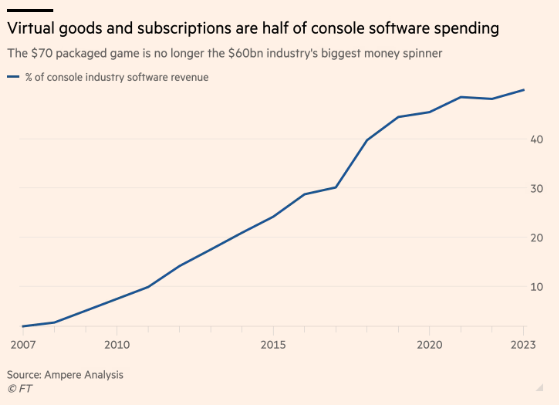Games console industry tries to adapt to rise of free-to-play titles
Virtual goods such as Fortnite weapons and subscription services such as Microsoft’s Game Pass have become as important to the console industry as its traditional money spinner of high-priced standalone games, marking a turning point for the $60bn business.
Console players are set to splash out $21bn on in-game items and subscription services this year — about the same as they will spend on game downloads and discs, according to research group Ampere Analysis.
Such expenditure has risen sharply since the popular free title Fortnite debuted in 2017. Gamers that year spent three times more on console software than on subscriptions and virtual items.
…
“If players continue to gravitate to free games, such as Fortnite, that do not require the latest hardware, Sony will find it more difficult to sell its PS5 to all but the most dedicated of players, some analysts have argued.”
Archived version of the article: https://archive.vn/032BW#selection-2369.103-2373.159


Be like the cool kids. Just say no to microtransactions.
Patient gamers gang rise up.
Is this is the reason why game companies are charging $70 and add microtransactions and battle passes to every game. If you’re shitting on it and still buying it, you’re part of the problem.
Best thing to do, is not buy the game at all. Whales don’t like spending money in empty games, they have no one to show off to. Simply avoiding the mtx isn’t good enough.
The big two are whales, which they actively target and exploit the addiction to the games, and kids. A surprisingly high amount of parents just leave their credit cards in the console and let the kids buy.
Funny, everything is about protect the kids now but nothing is being done about predatory micro transactions
we only have a switch and a few ios games, we pay for game, play game. Check done.
I’m saddened by the phenomenon because there’s plenty of evidence that the audiences for these most of these games hate the experience, but they can’t stop playing because they’ve become victims of predatory psychological tactics designed to keep them addicted and their wallets wide open. These publishers and studios literally hire psychologists who specialize in generating this addiction, using models optimized to prey on their own users as much as humanly possible. It’s sickening. The sports games are especially shameless about this. Ruining people’s finances and their core sense of financial responsibility to fatten their pockets. I don’t know how they sleep at night. Sociopaths, the lot of them.
Proof or ban.
Cite something. If you are going to make outrageous claims like this at least drop an article
I’m sorry, I don’t follow. What did I say that would be considered an outrageous claim?
Hiring psychologist
Problem with games as a service is that it’s really difficult to make a working model out of it. Many have tried, but few have succeeded. Even SE failed with Avengers. For every Fortnite there are also multiple failures. It’s a risky model.
Those few who succeed usually make these large sums of money.
The big problem is that a company will look at something like World of Warcraft/Destiny at the height of their popularity and think “We want that!”
Then they’ll put out a (we’re being optimistic here) serviceable, good game with a respectable amount of content… but it won’t be able to hold a candle to something that: already has that much content + more AND players who are already ‘stuck’ with the game (sunk cost, friends/family/community, etc).
So you put out a game, get a brief spurt of attention from people who are a bit bored of the same ol’ same ol’, but then once they breakneck through all the content you have in less than a month they turn around and head back to their comfort food game and never look back. Congratulations, you can now put out a master class on how to waste millions of dollars.
In order to make a game as a service now you need either an extremely good hook, or you need to not only be comparable to an existing game but also EXCEED what that game offers and continue to provide content at a staggering speed until you’ve coerced people to have invested enough in the game to then be their comfort food/sunk cost game of choice.
yeah, unfortunately everything and everyone is doing their dangdest to get there - that reoccurring revenue is toooo tempting.
Pretty sure I have never bought an item in game. I buy dlcs if I really enjoy the game and want to continue.
Maybe govt needs to crack down on in game purchases.
Or people need to be less dumb. Dunno. Is buying video game crap any worse than pints at the pub cigs at the shop. If I fill my house with figurines vs skins in a game.
Protect the vulnerable I suppose
I don’t see the relation between free games and latest hardware, does that analysts assume there will be no free games exclusive to next gen?
deleted by creator
We keep seeing a pivot to “services” in so many industries, from movies and tv to music to even Apple - expect the same from big gaming.
Sure, there will be some justifications for the new hardware, but it t will be for the niche hardcore gamers, but not for the majority.
Makes sense, it’s just the way it’s all going.
deleted by creator
Yeah, arguing against Microtransactions at this point is just being an old man that yells at clouds.
Not really considering the vast majority of people don’t use micro transactions. These companies make money by farming whales who have mental health/addiction issues.
I see this take a lot, and while I don’t disagree… I think it downplays the number of people who DO make ‘sensible’ purchases in a lot of these games.
I personally don’t bother with in-game purchases (I also rarely buy DLC… but I also sub to FFXIV regularly, and have all the content for Destiny 2, so sometimes I can be got) for cosmetics or especially boosts. I’d rather earn the items in game, or a step down, earn in-game currency to purchase those items instead because I’m, at the end of the day, paying for a game to play it and while I want to look good in game while doing so, I’m not gonna drop $15 on digital t-shirts.
But there are plenty of people who don’t mind tossing down $60 additionally a year into a game like Destiny 2 for sparkly new transmog outfits from the Eververse store, and they’ll see it as any sort of reason to do so (‘because I have the money’, ‘because I want to support the developer’, ‘because I have to collect everything’, ‘because because because’), and we can’t just pretend like its a handful of dudes dropping thousands of dollars while everyone else nobly boycotts the practice.
You are correct, but as someone who has worked in F2P mobile for a decade, it is true that most profitability comes from whales, at least in this market. You might have hundreds of thousands who spend as you mention (dolphins or minnows), but as a percentage of revenue, that aggregate is considerably smaller than the aggregate of whales: I’ve seen that ratio as high as 5:95 on a financially successful mobile F2P 4X strategy game, meaning 5% of total revenue coming from players with a lifetime spend of less than $250, 95% of total revenue coming from those above that. The populations of those groups is usually the opposite (very few whales vs. many dolphins and minnows).
Not all F2P models swing heavily into “whale-based”, but the traditional wisdom is similar to the casino industry. Large corporate companies often have small teams dedicated to servicing VIP players, ensuring they come back to the game through attractive offers or other gifts (https://www.gamesindustry.biz/how-does-zynga-hunt-for-whales-this-week-in-business).
Another component that people don’t understand is that often these aren’t “normal people” in terms of their income. We had geo-tagged data, so when you’re looking at your high level VIPs north of a million in lifetime spend, you’re talking about someone in UAE, someone in Petersburg, someone in Hong Kong, or someone in the Texas oil fields. That’s not to provide moral ammunition, but it is a different viewpoint from these games preying on people who don’t have money. A lot of whales have so much money, they just don’t care about spending $100s or $1,000s at a time.
Finally, I personally know at least 1 divorce caused by a game I worked on: the husband couldn’t stop spending, and it led to a separation. There are likely more. By the same token, I also know marriages caused by that same game.
If people are having issues with spending, please stop playing, stop spending, get help. If people don’t want this to be the dominate model, they need to support with their wallets. Having said that, there’s more free games to play than when I grew up. I do think that is pretty cool.
Microtransactions need to be regulated the way casinos are. Companies won’t do the right thing unless they are forced to.
It’s time for people to vote with their wallets and stop purchasing and playing games with predatory monetization models.
But saying that people complaining about MTX are like old man yelling at cloud is wrong. There will always be room for criticizing MTX like there will always be room for criticizing capitalism.
deleted by creator
I definitely agree with you on this. It’s possible to vote with your wallet and still lose the vote. But I simply mean to suggest that those of us who won’t stand for MTX filled games ought to embrace the games that don’t have them (or at least don’t compromise the experience for them) like god of war, or red dead 2 etc. and that we should reach back into our backlogs and find games that we missed and look to purchase and play those rather than get the latest full price games that are still filled with MTX
Yes. But if they’re predatory then they are abusing mental quirks. Similar to gambling there needs to be regulation. Especially on loot boxes and gatcha which are gambling.
No reason not to, though.
Fuck clouds







